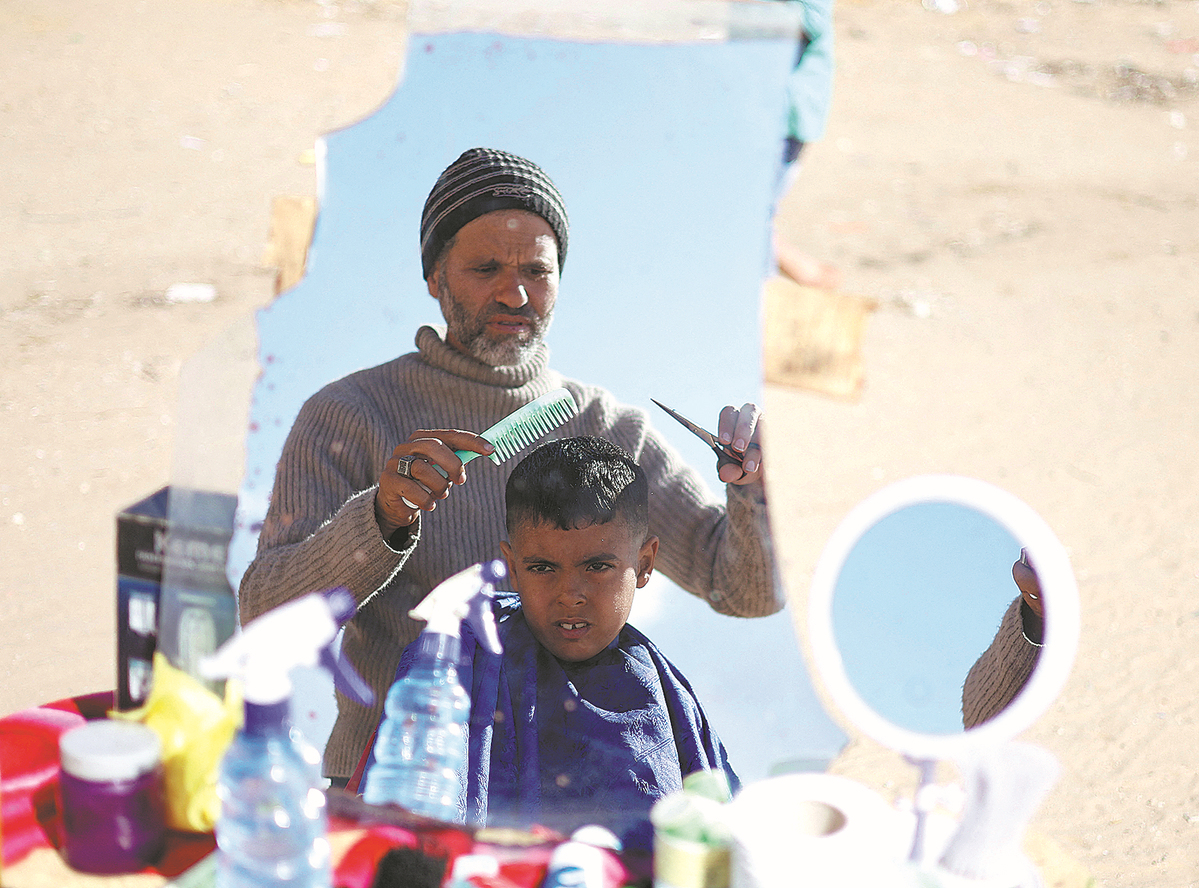 A child gets a haircut in Rafah, Gaza, on Wednesday as Israeli strikes displace Palestinians from their homes. MOHAMMED SALEM/REUTERS
A child gets a haircut in Rafah, Gaza, on Wednesday as Israeli strikes displace Palestinians from their homes. MOHAMMED SALEM/REUTERS
The joint call for a cease-fire in Gaza against Israel's planned military operation in Rafah will resonate in the international community, reinforcing the urgency for humanitarian considerations in conflict zones, experts said.
In a joint statement issued on Wednesday, Australian Prime Minister Anthony Albanese, Canadian Prime Minister Justin Trudeau and New Zealand's Prime Minister Christopher Luxon said they were gravely concerned over reports on Israel's planned military operation in Rafah, the last place of refuge for Palestinian refugees.
"We are gravely concerned by indications that Israel is planning a ground offensive into Rafah. A military operation into Rafah would be catastrophic," it said. "About 1.5 million Palestinians are taking refuge in the area, including many of our citizens and their families. With the humanitarian situation in Gaza already dire, the impacts on Palestinian civilians from an expanded military operation would be devastating."
The prime ministers urged the Israeli government not to go down this path. "There is simply nowhere else for civilians to go," it continued, urging for an immediate humanitarian cease-fire.
Colin Mackerras, emeritus professor at Griffith University in Australia, said the joint statement has a positive impact, as "those three prime ministers have been quite reluctant to oppose Israel and they have been pro-American".
"We have to oppose Israel invading," he said. "The fact is that this is going to cause a lot of civilian casualties. It's going to be mainly aimed at ordinary civilians. And I think it's very immoral."
Mackerras said it looks like a genocidal war that is being waged. "The reason why I said that is because it looks to be aimed against people of a particular nationality," Mackerras said. "Of course, they (the Israelis) say that it's all about opposing terrorism. To some extent, it is. But there are so many civilians killed or starved."
Hundreds of thousands of displaced Palestinians have been driven into Gaza's southernmost city by Israel's relentless military campaign, seeking shelter in a sprawling makeshift encampment near the Egypt border.
Despite pressure from foreign governments and aid agencies not to invade, Israel insists it must push into Rafah and eliminate Hamas.
French President Emmanuel Macron raised similar concerns in a phone call on Wednesday with Israeli Prime Minister Benjamin Netanyahu, the president's office said, saying further forced displacements of people could also bring regional escalation.
German Foreign Minister Annalena Baerbock said before talks with Netanyahu that people in Rafah with nowhere to go "cannot simply vanish into thin air".
Should the Israeli assault on Rafah go ahead, the risk of atrocities is "serious, real and high", Alice Wairimu Nderitu, the United Nations special adviser on the prevention of genocide, said on Wednesday.
Fuat Emir Sefkatli, a researcher at the Center for Middle Eastern Studies in Turkiye, said the joint statement could "serve as a role model for Western countries in preventing the ongoing humanitarian crisis in Gaza and may trigger responses".
By collectively calling for a ceasefire and highlighting the catastrophic implications of military actions on civilians, these nations amplify the critical narrative that military solutions cannot resolve underlying political conflicts, he added.
Arhama Siddiqa, a research fellow at the Institute of Strategic Studies Islamabad in Pakistan, said the joint communique reflects a growing disillusionment with Israel's actions.
"This sentiment underscores a notable shift in perspective, even among Israel's traditional allies, toward recognizing the severity of the Palestinian plight, identifying it as nothing short of genocide," she said.
Meanwhile, diplomatic efforts continued on Wednesday, with Turkish President Recep Tayyip Erdogan making his first visit to Egypt in over a decade. He said Turkiye stood ready in cooperation with Egypt to help rebuild Gaza after the conflict.
The military offensive launched by Israel after Hamas' attack has killed at least 28,576 Palestinians in Gaza and wounded 68,291 others, according to the Gaza-based Health Ministry. About 1,200 Israelis were killed by Hamas attacks on Oct 7, according to official Israeli figures.





